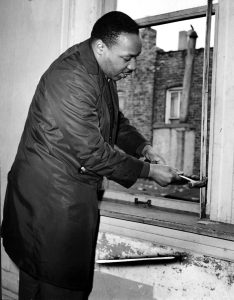 Dr. Martin Luther King Jr.’s most famous speech details his dream of racial integration, but he was also deeply invested in fighting for the rights of poor and working-class people regardless of race, and far beyond the American South.
Dr. Martin Luther King Jr.’s most famous speech details his dream of racial integration, but he was also deeply invested in fighting for the rights of poor and working-class people regardless of race, and far beyond the American South.
In fact, in 1966, he and his family moved to the West Side of Chicago into a slum apartment building to draw attention to issues of fair and open housing. At that time, King noted that “In the South, we always had segregationists to help make issues clear. This ghetto Negro has been invisible so long and has become visible through violence”, alluding to the then-recent uprising in Watts, California.
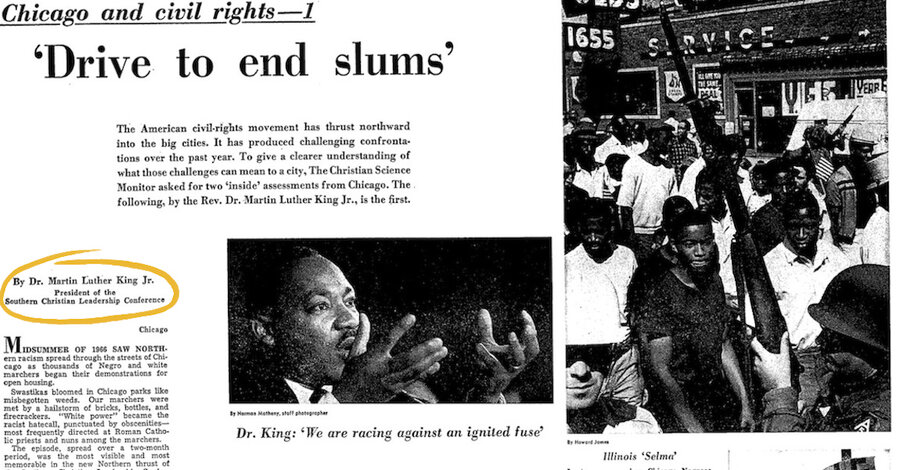
On the occasion of honoring King’s impact, I’m reminded of our recent conversation on THE DROP with Muhammad Ali’s eldest daughter, Maryum, who shared lesser-known details of her father’s relationship with King. She joined Mornings host Sugabear and myself for his Community Corner segment.
“They loved and respected each other,” she offered. “They did have different ideologies about how to deal with racism and oppression. My father was in the Nation of Islam at that time. He [later] converted to Orthodox Sunni Islam, but [in the 1960s] he was in the Nation, and they weren’t about the nonviolence resistance, but what’s interesting, they were nonviolent. They actually were.
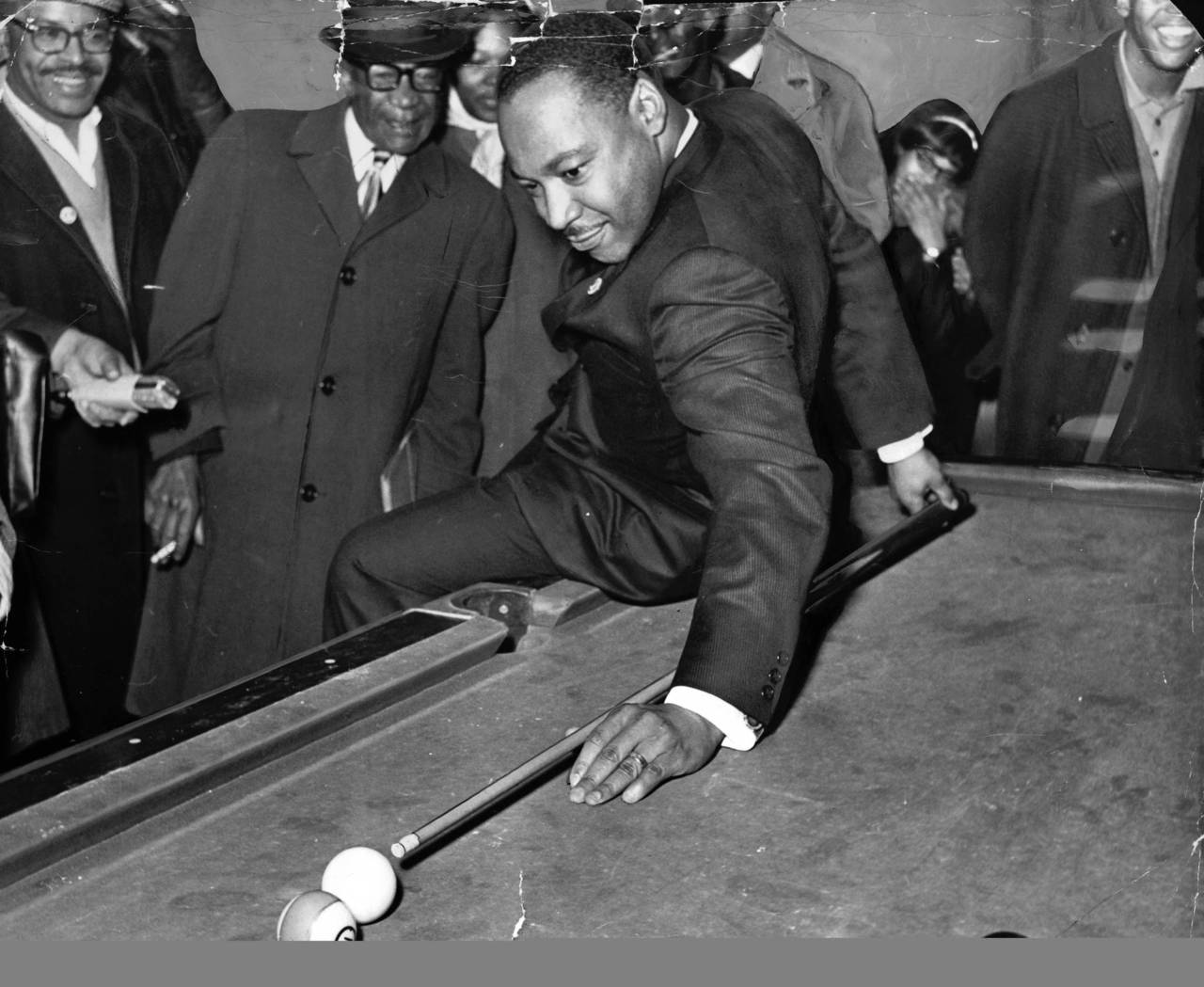
Civil rights leader Martin Luther King Jr. tries for a behind-the-back shot, while using his “best stick” in a pool match with Chicago civil rights leader Al Raby while working on an anti-slum campaign in Chicago. — Ed Wagner Jr., Chicago American historical photo, Feb. 17, 1966
The Nation was nonviolent against white folks. They don’t go out and hurt white folks. They were just about self-sufficiency, their own economic base. They were separatists, but they felt they were separatists because they were already being separated and treated unequally.
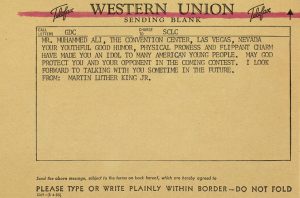 MLK, on the other hand, didn’t really agree with that, but my father and him did have a respectful relationship. In 1964, there was an FBI wire report saying they were in contact and talking. They did a press conference together in Louisville for a housing event, an equal housing event. They did talk back and forth and really respected one another. They really did. MLK sent my father a telegram in 1961 at his seventh professional fight with Jerry Quarry, acknowledging him, saying, ‘I want to meet you one day. You’re a great role model.’
MLK, on the other hand, didn’t really agree with that, but my father and him did have a respectful relationship. In 1964, there was an FBI wire report saying they were in contact and talking. They did a press conference together in Louisville for a housing event, an equal housing event. They did talk back and forth and really respected one another. They really did. MLK sent my father a telegram in 1961 at his seventh professional fight with Jerry Quarry, acknowledging him, saying, ‘I want to meet you one day. You’re a great role model.’
My dad sent a telegram to him the second time MLK was in the Birmingham jail. Not the first time, but the second time he went to jail there. They did have a love and respect for one another.”
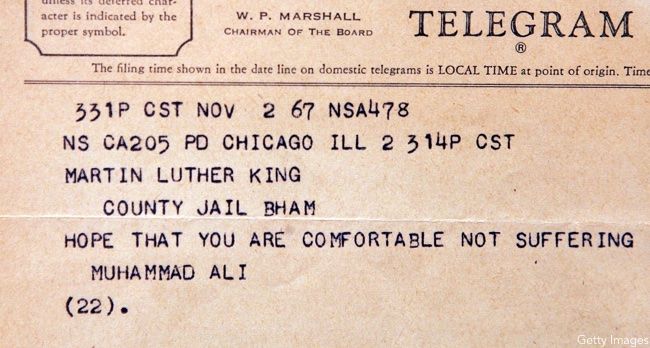
In fact, King and Ali met informally in March of 1967 in Ali’s hometown of Louisville and later participated in a press conference. According to Jonathan Eig’s book titled King: A Life, at that press conference Ali stressed that “We’re all Black brothers. We use different approaches to everyday problems, “but the same dog that bit him bit me. When we go out, they don’t start asking if you’re a Christian, a Catholic, a Baptist, or a Muslim. They just start whooping Black heads.”
King replied, “Yes. Oh, yes. We discussed our common problems and our common concerns. We are victims of the same system of oppression. Although our religious beliefs differ, we are still brothers.”
During our conversation with Maryum Ali, she further clarified that “at the end of MLK’s life, he almost started sounding like he was in the Nation, because his last sermon was going to be America May Go to Hell. That was because of the poverty situation and them not addressing these disparities in poverty. He was such a scholar. I remember asking my father about him. He said, ‘He was the true activist. I was an elite athlete, and I used my platform, which was very powerful.’ But this man, I’ll encourage everyone, please, one of my favorite books is called The Radical King, and it’s his most poignant speeches and essays.”
She continued, “[King] was trying to break down the way capitalism really treats the masses. He said, ‘Think about it. Why are 40 million people poor in this country?’ But he had, in addition to the Birmingham and Selma, which that gets featured, and that’s beautiful, he was doing major things for economic development in Chicago and Cleveland [via organizations such as the Southern Christian Leadership Coalition’s Operation Breadbasket].”
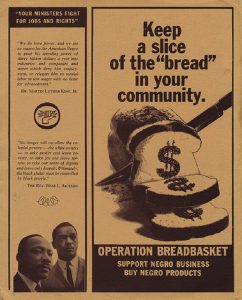
Operation Breadbasket Consumer Club, folder back cover circa 1969, Rev. Martin L. Deppe Papers, 4/2
At a 1967 press conference for Operation Breadbasket, Dr. King explained that “The fundamental premise of Breadbasket is a simple one. Negroes need not patronize a business which denies them jobs, or advancement [or] plain courtesy”. In a 1967 essay, titled “One Year Later in Chicago”, he further noted that “Many retail businesses and consumer-goods industries deplete the ghetto by selling to Negroes without returning to the community any of the profits through fair hiring practices”, an issue that still resonates nearly sixty years later.
In our conversation, Maryum Ali concluded, “He brought millions in income to these areas, through the SCLC and some of their economic development programs. Just masterful, which is why he was deemed the most dangerous Negro in the world by the FBI because he was about to bring in all people of all races and colors on this journey. He would’ve been able to do it. He had charisma. He had the intelligence, and he had the organizational skills to do it. His team had organizational skills. Anyway, I know I love the man.”